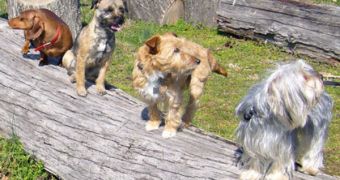There are literally hundreds of dog species around the world, and most of them can be easily recognized by their unique hairdos, featuring various types of curls, thicknesses, and other such elements. For a long time, experts have wondered what it is exactly that sets breed coiffures apart from one another in terms of genetic make-up. A new study has now revealed that only three genes are responsible for making dogs' hair look different from one canine to another, ScienceNow reports.
Over the years, dog breeders' interest in certain specific traits has prompted a large number of studies into some of dogs' most important characteristics, such as the ability to remain still for hours during a hunt, the aggressiveness and submission levels, and so on. It was only recently that a new investigation, conducted by experts at the National Human Genome Research Institute, in Bethesda, Maryland, and led by scientist Elaine Ostrander, found the switches that made some species have curly hair, while others had it long and straight.
For the new experiments, genetic material was collected from some 100 dachshunds, which is a species that comes with all types of hair – straight, wavy, short and long. The researchers went through more than 50,000 locations in the genomes, and then associated each of the differences they encountered with a different type of hair. They found, for instance, that wiry hair, mustaches, and eyebrows were associated with a variation on chromosome 13. This position holds the R-spondin-2, which encodes the specific proteins needed for such hair types.
In a new paper they published in the August 27th online issue of the renowned journal Science, the team also shows that the FGF5 is directly linked to the length of a dog's hair. While examining the genetic material of a number of other dog breeds, the experts found the FGF5 mutation in 91 percent of the long-haired breeds, and in 30 percent of the medium-haired ones. Overall, 903 dogs from 80 breeds were analyzed for the new research, the team highlights.

 14 DAY TRIAL //
14 DAY TRIAL //